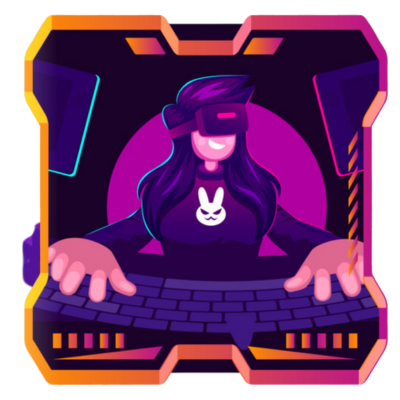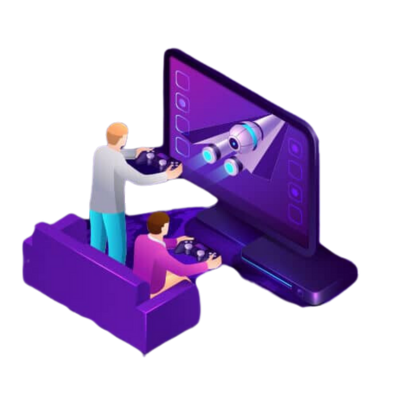Introduction
The gaming industry has always been a realm of rapid transformation, constantly evolving with the tides of technology. As consoles advanced from humble beginnings to powerhouses of digital entertainment, so too did the experiences they offer. But now, a new frontier emerges—one that not only entertains but rewards.
This is the world of play-to-earn (P2E) gaming, where players are not just participants in virtual worlds but economic actors within them. With innovations like Metaverse NFT game development, these digital realms are becoming more immersive and economically significant than ever. Could this be the future of gaming? And if so, what role will consoles play in shaping this landscape?
Level up to earn real rewards!
Our team of expert is on hand to assist you

The Evolution of Consoles and Virtual Worlds
Consoles have journeyed far from their early days of 8-bit graphics and simple mechanics. The original Atari and NES systems delivered entertainment in compact, digestible formats, introducing millions to the joys of gaming. Yet, these early experiences were merely stepping stones. The transition from pixelated displays to sprawling 3D worlds marked a turning point, thanks in large part to systems like the PlayStation and Nintendo 64. Suddenly, games were not just levels to complete—they were places to explore.
As consoles evolved, so did the concept of virtual worlds. With the advent of the Xbox and PlayStation 2, gaming became more than a solitary endeavor. Online multiplayer experiences took hold, connecting players worldwide, making virtual worlds not just expansive but social. The boundary between the real and the virtual grew thinner, laying the groundwork for the immersive experiences of today. This shift towards more complex digital economies has also driven demand for specialized services like Web3 game development services, which focus on integrating blockchain technology and decentralized gaming experiences.
Then came virtual reality (VR) and augmented reality (AR), where consoles such as the PlayStation VR started pushing the envelope further. Players found themselves not just observing virtual environments but stepping inside them. The possibilities became endless: from futuristic cities to fantastical realms, consoles were shaping not just games but entire worlds where players could exist. Blockchain development companies have since emerged as key players, helping to build the infrastructure necessary to create these expansive and decentralized virtual environments.
The Rise of Play-to-Earn Gaming
Meanwhile, another paradigm shift was brewing. Blockchain technology brought with it the promise of true digital ownership. No longer were in-game items merely data on a server—they could be assets owned, traded, and even monetized. This gave birth to play-to-earn (P2E) gaming, a model where players could earn real-world value through their in-game actions.
Games like Axie Infinity and The Sandbox gained traction, showing that players were more than willing to invest time and resources when there was a tangible return. These games offered more than just entertainment; they presented economic opportunities. For some, P2E became a secondary income stream, and for others, a primary livelihood. The surge in popularity of P2E gaming has also led to the rise of specialized services like NFT marketplace development companies that help games implement systems for buying, selling, and trading in-game assets. However, this rise wasn’t without its hurdles—entry barriers, sustainability concerns, and even criticisms of game quality cast shadows on this burgeoning trend.
Crypto wallet development is also crucial for P2E players who need secure ways to store their in-game earnings. As digital economies grow, the demand for user-friendly wallets that integrate seamlessly with gaming platforms will only increase. This convergence of gaming and financial technologies highlights the importance of crypto wallet development services in making P2E accessible to a wider audience.
The Intersection of Consoles and Play-to-Earn Gaming
Now, imagine a scenario where P2E mechanics integrate seamlessly into console ecosystems. Today’s consoles, with their powerful hardware and growing online infrastructures, are already primed for blockchain integration. They could serve as gateways to not just gaming, but to digital economies where players truly own their achievements. A rare sword in a fantasy RPG, for instance, could be more than a powerful weapon—it could be an asset traded on the open market, with value beyond the confines of the game.
The integration of digital asset ownership on consoles could open new frontiers. Imagine trading a hard-earned digital skin across different games, or even platforms, without friction. Blockchain could be the bridge that connects these experiences, ensuring secure ownership and transparency. Companies specializing in smart contract development could play a critical role in enabling secure transactions, ensuring that players’ assets are protected as they move across virtual worlds. Major console manufacturers like Sony and Microsoft, already at the forefront of gaming innovation, have the resources and influence to make such integrations a reality. The question is not if, but when.
Start earning while you game today!
Our team of expert is on hand to assist you

Future Possibilities: Virtual Worlds, Consoles, and P2E
With blockchain’s potential and consoles’ capabilities, the future of virtual worlds looks radically different. Today’s consoles may be seen as powerful gaming devices, but tomorrow, they could be gateways to digital realms that are as economically significant as they are immersive. Consider a world where players can jump between games and digital spaces seamlessly, carrying their assets, achievements, and even reputations across platforms.
The concept of a metaverse—an interconnected digital universe—is already in the works, with companies like Meta (formerly Facebook) and Epic Games making strides toward creating virtual spaces where gaming, socializing, and working converge. Here, consoles will play a pivotal role. They offer the hardware muscle and user base needed to make the metaverse not just a concept, but a lived experience. With services from a metaverse NFT marketplace development company, these digital worlds could become more interoperable, allowing users to transfer assets between games and experiences with ease.
Blockchain game development companies are increasingly focusing on creating decentralized virtual worlds that support cross-platform integration. This development will enable players to traverse the metaverse without limitations, turning gaming into a holistic experience rather than just a form of entertainment. In this landscape, platforms for DeFi development and token development could provide gamers with additional financial incentives, such as staking rewards for holding in-game assets.
Challenges and ints Solutions
| Challenge | Solution |
| Regulatory Scrutiny | Collaborate with regulators for clear guidelines. Utilize smart contracts for transparent operations. Partner with a blockchain development company. |
| Balancing Gameplay and Monetization | Prioritize gameplay-first design. Use NFT staking and balanced reward systems. Involve Web3 game development services to enhance user experience. |
| Technological Barriers | Partner with smart contract and crypto wallet development companies for integration. Use scalable infrastructure and establish interoperability standards. |
| Security Concerns | Implement decentralized security measures like blockchain-based identity verification. Conduct regular smart contract audits with blockchain game developers. |
| Economic Sustainability | Use dynamic reward systems and integrate DeFi mechanics, such as staking and liquidity pools. Collaborate with a DeFi development company for balance. |

Conclusion
The rise of play-to-earn games represents a significant shift in how we perceive gaming—transforming it from a pastime into a potential economic activity. While it may not replace traditional gaming, it will certainly augment it, offering new layers of engagement and possibilities for players. Consoles, having been instrumental in the evolution of gaming thus far, are poised to play a crucial role in the next chapter.
As the lines between the real and virtual continue to blur, consoles may soon become the primary portals to expansive digital economies and interconnected virtual worlds. With the integration of smart contract development, in-game assets can be securely owned, traded, and even monetized, making players’ choices and the assets they accumulate extend far beyond pixels on a screen, holding real-world implications. For the gaming industry, the future may well be not just in the play, but in the earn.



